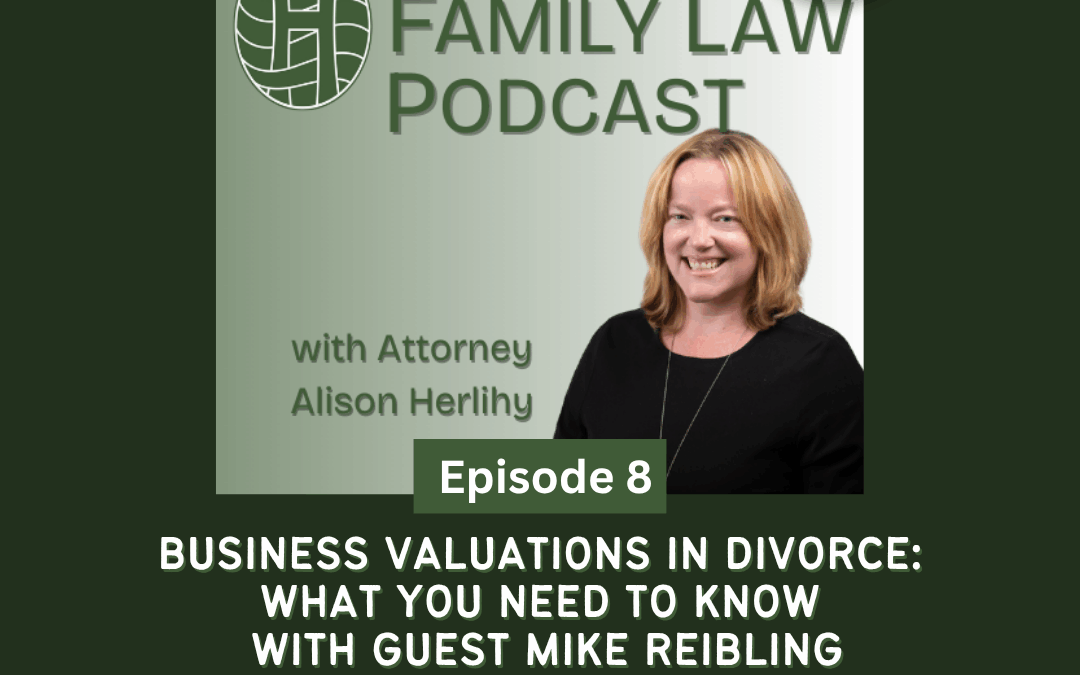Podcast Episode #8: Business Valuations in Divorce: What You Need to Know with Guest Mike Reibling
In Episode 8 of Herlihy Family Law, attorney Alison Herlihy is joined by Mike Reibling, a Certified Public Accountant and Certified Valuation Analyst, to explore the role of business valuations in divorce. With extensive experience valuing businesses and other assets for family law cases, Mike offers practical insight into how business interests are assessed, what documents are needed, and how these valuations impact equitable distribution in a divorce.
Why Business Valuations Matter
A business is often one of the most significant assets in a marital estate. Determining its accurate value is essential for ensuring a fair division of assets. Courts rely on these valuations to make informed decisions, especially when one or both spouses have ownership interests in the business.
Credentials That Matter
Not every CPA is equipped to conduct a business valuation. Specialized certifications—such as Certified Valuation Analyst (CVA) and Accredited in Business Valuation (ABV)—indicate specific training and expertise in this area. These designations are critical for credible, court-admissible valuations.
Methods of Valuation
The income approach is most commonly used for privately held businesses. This includes two primary methods:
- Discounted Future Cash Flows: Projects future earnings and discounts them to present value.
- Capitalization of Earnings: Uses historical financial data when future performance is expected to remain consistent.
Other valuation methods, like market comparisons, are less effective for small, unique businesses without reliable benchmarks.
Industry Differences and Asset Weighting
Valuations focus heavily on cash flow, making the process relatively industry-agnostic. However, businesses with high-value equipment or tangible assets—like construction companies—may require a blended approach, weighing both income and asset values.
Retirement Assets and Business as Marital Property
When distinguishing marital from non-marital property, factors like the timing of asset acquisition and state-specific laws on goodwill come into play. For example, pre-marital retirement savings and related earnings may be excluded from the marital estate. Similarly, the value of a business may include or exclude “personal goodwill” depending on the judge’s interpretation.
Uncovering Hidden Assets and Red Flags
Delays in producing financial records, excessive management fees, and unusual loans between the owner and the business can signal attempts to hide or undervalue assets. Subpoenas, motions to compel, and detailed forensic accounting can help uncover these issues and ensure full disclosure.
Essential Documents for Valuation
Accurate valuations depend on five years of tax returns, financial statements, and ideally a QuickBooks backup file. These tools allow analysts to run customized reports and conduct deeper financial analysis beyond standard balance sheets or P&Ls.
Business Owner Misconceptions
Many owners assume their business will fund their retirement, but this expectation often exceeds the business’s true value. Additionally, paying oneself an unreasonably low salary can backfire when valuations are adjusted to reflect market-rate compensation for the owner’s role.
Honesty and Early Involvement Are Crucial
The most effective valuations occur when experts are brought in early and when all parties are forthcoming with documentation. Courts take misrepresentation seriously, and undisclosed or inaccurate information can negatively impact the outcome of a case.
Listen to the Full Episode
For more expert insights like these, tune in to the Herlihy Family Law Podcast at herlihyfamilylaw.com/podcast. Visit herlihyfamilylaw.com to learn more about navigating divorce and asset division. To connect with Mike Reibling for a business valuation, visit his website at mrbizvalue.com.

